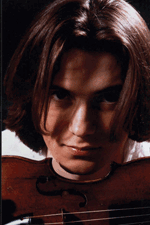> [Archived] Interviews

Vlad Maistorovici performed at the Barbican Hall
On March 13th, 2011, one of the most prestigious orchestral ensembles in the world - London Symphony Orchestra - performed the work Halo by Vlad Maistorovici at the Barbican Hall in London for the first time. This is the second collaboration of a young Romanian composer with the Londoner orchestra, for which he wrote in 2009 another opus, called Mikrokosmos.
There were two projects from the London Symphony Orchestra within the programme called Discovery Panufnik Young Composers Scheme, of which Vlad Maistorovici told us more:
How does this programme work and according to which criteria are the young composers elected?
It is a very interesting programme, an amazing initiative of the Panufnik Foundation, sustained by the Hamlyn Group. It is a programme where the young composers are selected to write short works for London Symphony Orchestra; that is how I started two years ago, with Mikrokosmos. After the workshop with the orchestra there is sometimes selected a composer who has to write a more ample work which will be performed at the Barbican Hall. I had the privilege to be the selected composer and I received this project from the orchestra, which is a great honour to me.
During the programme is there a group of composers who observe the activity of the young composers? I have seen mentioned, for instance, the name of Magnus Lindberg...
Yes , Magnus Lindberg is not directly involved, but Colin Matthews is. He is the mentor of this programme. The conductor Francois Xavier Roth, who also runs the workshop, guided me, as well.
The one who conducted, as a matter of fact, Mikrokosmos too, in 2009 ...
Yes, exactly. We also were advised by the piano player David Alberman, who is the principal second violin (in the London Symphony Orchestra ) and who is more experienced with contemporary music; he was a member of the Arditti Quartet and many times the leader of the London Sinfonietta Orchestra , so he is a good performer of contemporary music.
How would you describe Halo opus? And I would like to ask you to start with the title - which would be 'halou' in Romanian; what inspired you?
I think that a better translation in Romanian would be 'Aureolă'; it is about the effect which takes place around a source of light and that was the image which inspired me.
Does the title have a mystic, religious connotation?
Not really. It is a sensorial work, which has to do with sensations, colours. However the meaning is open. The initial image was tied by the optic phenomenon. Of course it is an illusion, because a halo is an effect which is produced through the propagation of light into the atmosphere. So it is not real.
Together with the Mercury Quartet (where you are the principal violinist) you experimented for a while what it is called 'live composition' - a concept based on improvisation. And because many times the performer's preoccupations are found in the musical ideas of the composer, I would like to know if the improvising technique is found in your scores or not?
For now I did not use casual techniques at all. Generally, I like to maintain the control and not oblige the instrumentalists who are not happy when they assume such a risk to have to do it. And in an orchestral play it is hard because there are one hundred people. Mercury Quartet is a very special ensemble because of the personalities who are implied - the other three colleagues of mine are very adventurous and eager to try a lot of things. I am sure that when you work with improvisation you walk on roads which have no future, but you also have many satisfactions when you find roads less trodden by and which inspire you a lot. Especially for me, the composer -the quartet is an extraordinary laboratory.
Returning to the concert on March 13th - London Symphony Orchestra had two conductors at the music rack: Sir Colin Davis and Clemens Schuldt, the last being the winner of the Donatella Flick Conducting Competition of 2010 and the one who conducted your work. How were the rehearsals and how did you collaborate with Clemens Schuldt? Were there maybe suggestions from Sir Colin Davis whose present assistant is Clemens Schuldt?
It is an advantage to have the work in a concert of Colin Davis. And that was seen in the selling of the tickets: the hall had been full of people for a half of month. Surely, I was sorry that he did not have time to take care of my work because he was a very appreciated and busy conductor. Clemens is extraordinary and I would not have wanted anybody more committed, open and who really put a lot of heart in the studying of the score. We discussed a lot, we met a long time before the concert, worked on the details, he listened to other works of mine and was very open. He is a young conductor, but a real professional.
March will be a busy month for you, because you are not only conductor but also a violinist, with many appearances on the stages in the whole Europe. What is your schedule over the next period?
After this premiere I will fly to Switzerland, where I have a tour which includes concerts of Mendelssohn - the concert in E minor- and a modern work, written by Pascal Dusapin, a concert whose heading is Quad. Then I will return to London for a concert with the Mercury Quartet and so on ...
Translated by Elena Enache and Elena Daniela Radu
MTTLC, Bucharest University














